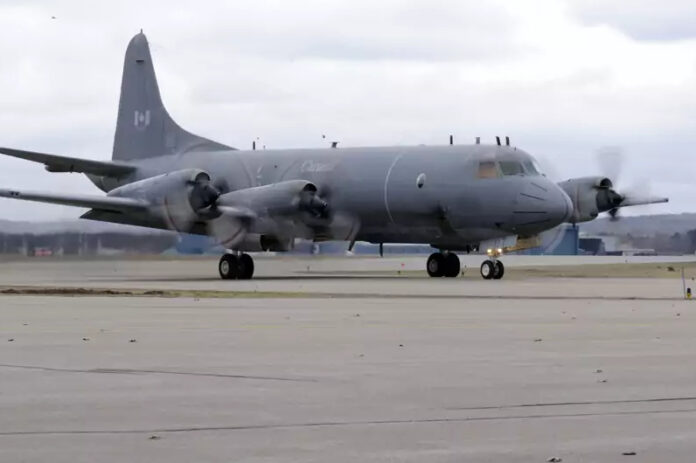(Ottawa) Bombardier and General Dynamics are ready to take on the Trudeau government in court if it refuses to issue a call for tenders for the billion-dollar contract to replace the aging CP-140 Aurora maritime patrol aircraft of the Royal Canadian Air Force (RCAF), La Presse has learned.
These two heavyweights in the Canadian aeronautical industry issued this warning in a recent letter sent to federal ministers while Ottawa is leaning towards a direct agreement with the American giant Boeing for the purchase of 16 P-8A Poseidon aircraft specializing in maritime surveillance.
By sending this missive to Finance Minister Chrystia Freeland and three of her colleagues, Bombardier and General Dynamics are drawing a line in the sand. La Presse obtained this seven-page letter, dated November 3 and signed by the president and general manager of Bombardier, Éric Martel, and the vice-president and general manager of General Dynamics Mission Systems, Joël Houde.
“Refusing to solicit bids […] would be contrary to the law and will expose the Government of Canada to significant litigation risks and the strong possibility that another high-profile military purchase will end in failure,” assert MM. Martel and Houde in this letter.
They invoke the Government Contracts Regulations as well as the Canadian International Trade Tribunal Act, among others, to highlight the federal government’s purchasing obligations and the specific and limited circumstances which allow it to grant contracts without launching a call for tenders.
According to them, the federal government cannot invoke these circumstances (extreme urgency, where a delay would be detrimental to the public interest, the nature of the market such that a call for tenders would not serve the public interest or even the fact that the contract cannot be executed by a single person or company) to justify the award of this contract worth nearly nine billion dollars without going through a call for tenders.
“None of these circumstances exist in the present case. Although issuing a transparent and competitive tender may be more expensive, it does not relieve the government of its obligations under the law. On the contrary, the Government of Canada is required to undertake a request for information in order to allow healthy and transparent competition among bidders with the aim of ensuring that the Canadian obtains the best solution at the best price,” they argue.
In their letter, the top bosses of Bombardier and General Dynamics also say that awarding a no-bid contract to Boieng for aircraft that are essentially at the end of their life and are not needed until the 2030s is “irresponsible tax-wise.” Especially since these planes are expected to undergo costly upgrades, while the Ministry of Defense is asked to generate savings of nearly $1 billion over the next five years.
On Tuesday, the CEO of Bombardier testified before a parliamentary committee on the management of this file. Before the deputies, Éric Martel maintained that Bombardier is fully capable of building and delivering state-of-the-art maritime patrol aircraft, less polluting, at lower cost and within the required time frame. Also, Mr. Martel did not mince his words to criticize the lack of transparency and fairness of the Ministry of Public Services and Procurement, which is leading the process to obtain replacement planes for the Ministry of Defense .
That said, Mr. Martel’s tone regarding the use of the legal option has gradually evolved in recent months. If he was content to assert, last spring, that Bombardier would study “all options at its disposal” in the event of the conclusion of a mutual agreement between Canada and Boeing, the boss of Bombardier had shown himself much more firm, on October 26, in a telephone interview with La Presse.
Mr. Martel then indicated that the Quebec aircraft manufacturer was ready to take legal action if the Trudeau government did not make “this decision”, or opt for a call for tenders.
“I am convinced that we have the means to go to court,” said the Bombardier manager. We have checked and we are ready to do so if necessary. I hope that a Council of Ministers does not want a court to make the decision for them. »
The Trudeau government will have to decide quickly between awarding a contract by mutual agreement or a call for tenders. On June 27, the American government authorized the sale of P-8As to Canada for US$5.9 billion. According to information published on the US Department of Defense website, these terms are generally in effect for 85 business days. Wednesday was the 96th day since Washington’s announcement.
Asked about this process, a spokesperson for Public Services and Procurement Canada, Alexandre Baillairgé-Charbonneau, responded that “the government is not authorized to provide details of the offer received from the United States government without authorization from this one “. “Discussions are continuing and no decisions have been made,” he wrote.
On Wednesday, the Minister of Industry, François-Philippe Champagne, once again affirmed that Ottawa was still considering it, even if Canada has taken steps with the American government to obtain the green light to purchase aircraft from Boeing.
“I have been in conversation with Mr. Martel for months. […] There are three things in this file. There is a national security issue, there is an issue of making the best choice for taxpayers, and then at the same time promoting the aerospace industry. We are the third country in the world in aircraft production. So, there are thousands of subcontractors in this industry. So, the choice we are going to make must take these three issues into account. »















